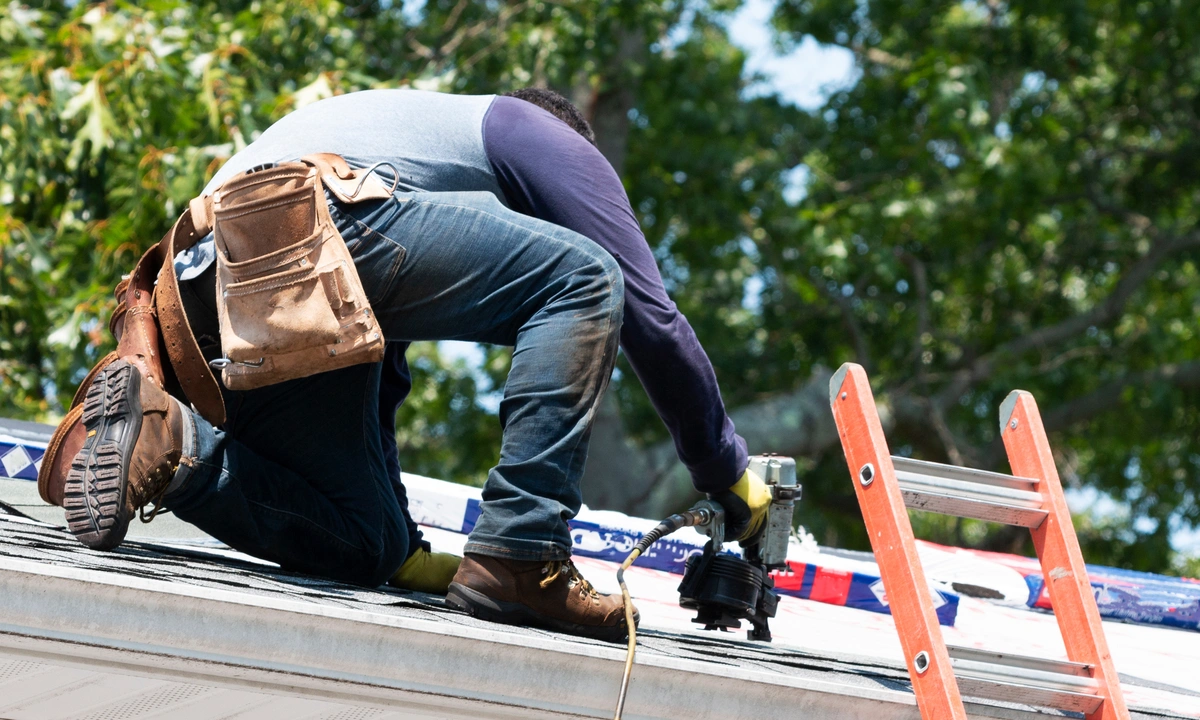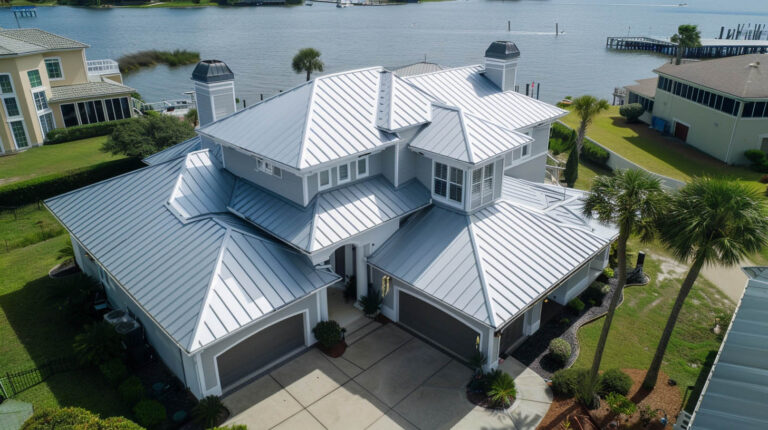
Blog
7 Tips for Affordable Roofing Projects
Your roof is one of the most critical components of your home. It protects you and your belongings from the elements, so it’s essential to ensure it’s in good condition. However, roofing projects can be expensive, often causing homeowners to postpone necessary repairs or replacements due to budget constraints.
The good news is that there are ways to make roofing more affordable without compromising on quality or safety. In this blog post, we’ll explore:
- Various tips for affordable roofing, including
- The average cost of roofing projects
- How to save money
- Financing options
- How to find a quality contractor
Keep reading to learn how to make your roof repair or replacement fit your budget!
Understanding the Average Cost of Roofing Projects

Before delving into cost-saving strategies, it’s essential to have a basic understanding of the average cost of roofing projects. Roofing costs can vary widely based on factors such as the type of material, the size of your roof, and the complexity of the project. Here are some ballpark figures for common roofing projects:
Roof Repairs
- Minor repairs: $150 – $400
- Moderate repairs: $400 – $1,000
- Major repairs (e.g., leaks or structural issues): $1,000 and up
Roof Replacement:
- Asphalt shingles: $5,000 – $15,000 (for an average-sized home)
- Metal roofing: $10,000 – $20,000
- Tile or slate roofing: $15,000 – $30,000
Please note that these are rough estimates and can vary significantly depending on your location and specific project requirements. Now, let’s explore how you can save money on your roofing project without compromising on quality.
How to Save Money on Your Roofing Project: 7 Tips
Roofing services often come with a hefty price tag. Looking to save some money? Here are 7 tips you can follow to get a fair price.
1. Regular Maintenance
One of the most effective ways to save money on roofing is by conducting regular maintenance. Inspect your roof at least once a year for signs of damage or wear and tear. Promptly addressing minor issues can prevent them from escalating into costly repairs.
2. Choose Cost-Effective Materials
While premium roofing materials might be enticing, they often come with a hefty price tag. Consider cost-effective options like asphalt shingles, which provide durability and protection without breaking the bank. Always research materials and choose ones that align with your budget and climate conditions.
3. Get Multiple Quotes
Don’t settle for the first roofing contractor you find. Obtain quotes from multiple reputable contractors in your area. This will help you compare prices, services, and the quality of materials they offer. Be cautious of exceptionally low bids, as they may indicate subpar workmanship or the use of inferior materials.
4. Roof Over Instead of Tear Off
If your existing roof is in relatively good condition with only one layer of shingles, consider a roof-over installation instead of a complete tear-off. Roof-over involves adding a new layer of shingles on top of the existing ones, saving you money on labor and disposal costs. However, check local building codes and consult with a professional to ensure this option is viable for your home.
5. DIY Where Possible
If you have some DIY skills and the necessary safety precautions, you can tackle smaller roofing tasks yourself. This may include cleaning gutters, replacing damaged shingles, or applying roof sealant. Just be sure not to take on projects that require professional expertise, as mistakes can be costly.
6. Energy-Efficient Roofing
Invest in energy-efficient roofing materials, such as cool or reflective roofing options. These materials can help reduce your energy bills by reflecting more sunlight and absorbing less heat. While the initial cost might be slightly higher, the long-term savings can outweigh it.
7. Take Advantage of Tax Credits
In some cases, you may be eligible for tax credits or incentives for installing energy-efficient roofing materials or solar panels. Check with your local and federal authorities to see if you qualify for any financial incentives that can offset your roofing expenses.
Exploring Financing Options
If you find it challenging to cover the upfront costs of a roofing project, several financing options can make the process more manageable:
- Home Equity Loan or Line of Credit: If you have substantial equity in your home, you can consider taking out a home equity loan or line of credit to finance your roofing project. These options typically offer competitive interest rates and may be tax-deductible.
- Roofing Financing Programs: Some roofing companies offer financing programs to help homeowners spread the cost of their roofing projects over time. These programs often come with attractive interest rates and flexible repayment terms.
- Personal Loans: You can apply for a personal loan from a bank or online lender to cover your roofing expenses. Personal loans are unsecured, meaning you don’t need to use your home as collateral. However, interest rates can vary, so it’s essential to shop around for the best terms.
- Credit Cards: While not the most cost-effective option due to higher interest rates, using a credit card can be a convenient way to finance a smaller roofing project. Just be sure to pay off the balance promptly to avoid accumulating significant interest charges.
Finding a Quality Contractor

Finally, ensuring that you work with a reputable and skilled roofing contractor is crucial for the success of your project. Here are some tips for finding a quality contractor:
Check Credentials
Verify that the contractor is licensed, bonded, and insured in your state. These credentials demonstrate their professionalism and commitment to quality work.
Read Reviews and Ask for References
Look for online reviews and ask the contractor for references from past clients. Contact these references to inquire about their experience and satisfaction with the contractor’s work.
Get Everything in Writing
Before starting any work, make sure you have a detailed written contract that outlines the scope of the project, materials used, timeline, and payment schedule. Avoid contractors who refuse to provide written estimates or contracts.
Seek Multiple Bids
As mentioned earlier, obtain quotes from multiple contractors. This not only helps you compare prices but also gives you a better understanding of the market rates for your project.
Ask Questions
Don’t hesitate to ask the contractor questions about their experience, the materials they recommend, and their process. A knowledgeable contractor should be able to provide clear and concise answers.
Check for Warranties
Inquire about warranties on both the materials and the labor. A reputable contractor should offer warranties to guarantee the quality and longevity of their work.
Talk With Your Local
Roofing projects don’t have to drain your bank account. By following these tips for affordable roofing, you can maintain or replace your roof while staying within your budget.
Remember to prioritize regular maintenance, choose cost-effective materials, and explore financing options when necessary. Most importantly, work with a reputable contractor who will ensure the job is done right, protecting your home and your investment for years to come.At Avenue Roofing, we’ll help you understand all of your options while also providing free estimates for all of your roofing projects. Contact us today to learn more!



